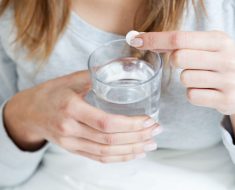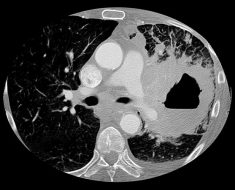Sunday Brunch: Tim Lovejoy and guests discuss cold showers
We use your sign-up to provide content in ways you’ve consented to and to improve our understanding of you. This may include adverts from us and 3rd parties based on our understanding. You can unsubscribe at any time. More info
The data comes courtesy of two studies, one from the Netherlands and one from the Czech Republic.
Research in the Netherlands was conducted on over three thousand people and found “a routine cold shower resulted in a statistical reduction of self-reported sickness absence in adults without severe comorbidity”.
Meanwhile the Czech study concluded that when athletic men were immersed in cold water three times a week for six weeks that it boosted their immune system.
However, while the conclusions of the study were positive the researchers cautioned: “The biological significance of the changes observed remains to be elucidated.”

Other benefits of cold water immersion, showering or bathing include the activation of the sympathetic nervous system.
This part of the nervous system governs the body’s fight or flight response which creates a hormone known as noradrenaline.
It is for this reason that cold showers are thought to lead to health improvements as the production of this hormone increases the heart rate and blood pressure.
Furthermore, immersion in cold water is thought to improve circulation.
A 2020 study on nine men found that after four weeks of immersing themselves in cold water that blood flow to and from their muscles had improved.
The potential benefits of cold water immersion and exposure are not new.
A study conducted in the year 2000 discovered that participants exposed to cold water experienced a 350 percent increase in their metabolism.
This in turn means that prolonged periods of taking cold showers could help people to lose weight.

As well as providing physical benefits, cold showers and immersion in cold water is thought to potentially have mental health benefits too.
This includes the treatment of depression, in 2008 Nikolai Shevchuk proposed how this works.
Shevchuk suggested that during a cold shower an overwhelming number of electrical signals are sent to the brain due to the high number of cold receptors in the skin suggesting that this results in an anti-depressive effect.
In a trial of his theory Shevchuk discovered: “The therapy was found to have a significant analgesic effect and it does not appear to have noticeable side effects.”

The idea of cold water improving overall health is backed up by the existence of Cold Water Therapy, a form of medicine that has experienced a revival in recent decades.
Athletes too have harnessed the power of cold-water immersion with ice baths becoming a common feature of training routines since the turn of the century.
These ice baths are used as a form of cryotherapy to enable muscle recovery, alleviate soreness, and reduce the risk of injury.
Overall, there is significant evidence to suggest a cold shower in the morning, while uncomfortable and shocking at first, could have notable long-term benefits.
Source: Read Full Article





